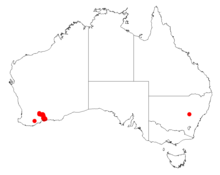Acacia heterochroa
Acacia heterochroa is a shrub belonging to the genus Acacia and the subgenus Phyllodineae that is endemic to south western Australia.
| Acacia heterochroa | |
|---|---|
| Scientific classification | |
| Kingdom: | Plantae |
| Clade: | Tracheophytes |
| Clade: | Angiosperms |
| Clade: | Eudicots |
| Clade: | Rosids |
| Order: | Fabales |
| Family: | Fabaceae |
| Clade: | Mimosoideae |
| Genus: | Acacia |
| Species: | A. heterochroa |
| Binomial name | |
| Acacia heterochroa | |
 | |
| Occurrence data from AVH | |
Description
The glabrous spreading shrub typically grows to a height of 0.3 to 2.0 metres (1 to 7 ft).[1] It has terete and ribbed branchlets that are dusted in a white powder. The new shoot tend to be a reddish colour with stipules that are easily detached. The grey-green phyllodes have an elliptic to ovate or sometimes almost circular shape with a length of 1 to 3.5 cm (0.39 to 1.38 in) and a width of 1 to 2.5 cm (0.39 to 0.98 in) with a prominent midrib and marginal nerves.[2] It produces yellow flowers from April to December.[1] The simple inflorescences have large spherical flower-heads containing 5 to 12 loosely packed bright lemon yellow flowers. The linear to curved and erect seed pods that form after flowering have a length of up to 6.5 cm (2.6 in) and a width of 3 to 4 mm (0.12 to 0.16 in). The purplish-red pods are thick and woody and dry to a black colour. The glossy brown seeds within the pods have an oblong shape and are 3.5 to 4 mm (0.14 to 0.16 in) in length.[2]
Taxonomy
The species was first formally described by the botanist Bruce Maslin in 1995 as part of the work Acacia Miscellany. Acacia myrtifolia (Leguminosae: Mimosoideae: section Phyllodineae) and its allies in Western Australia as published in the journal Nuytsia. It was reclassified as Racosperma heterochroa in 2003 by Leslie Pedley then transferred back to the genus Acacia in 2006.[3] There are two recognised subspecies:
- Acacia heterochroa subsp. heterochroa
- Acacia heterochroa subsp. robertii
It belongs to the Acacia myrtifolia group.[2]
Distribution
It is native to an area along the south coast in the Goldfields-Esperance and Great Southern regions of Western Australia where it is found on hilltops and ridges growing in gravelly lateritic soils.[1] The shrub is mostly found between Holt Rock and Ravensthorpe in open woodland or mallee communities.[2]
See also
References
- "Acacia heterochroa". FloraBase. Western Australian Government Department of Parks and Wildlife.
- "Acacia heterochroa". World Wide Wattle. Western Australian Herbarium. Retrieved 12 May 2019.
- "Acacia heterochroa Maslin". Atlas of Living Australia. Global Biodiversity Information Facility. Retrieved 12 May 2019.